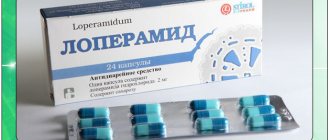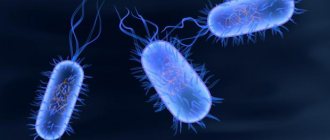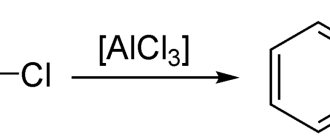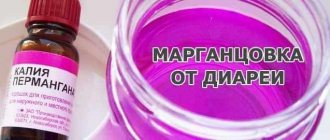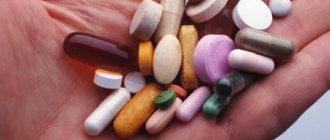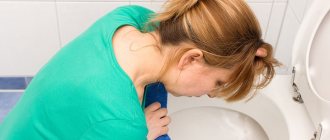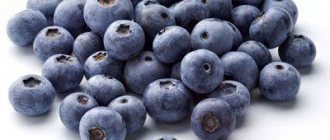Loperamide is an antidiarrheal medicine. These tablets help fight diarrhea in both adults and children.
The human intestine is capable of absorbing 99% of liquid, but during diarrhea its absorption deteriorates. The intestines lose the ability to absorb water normally.
As a result, with diarrhea, a person develops loose stools that contain a large amount of water.
Also, with diarrhea, the work of the stomach accelerates, which is why many people with this pathology have difficulty controlling the urge to defecate.
Composition and release form
The anti-diarrhea drug Loperamide is available in the form of drops, tablets, capsules and lozenges. Regardless of the form of release, the active ingredient Loperamide hydrochloride, which is part of the medicine, helps against diarrhea, the dosage of which is 2 mg per tablet, capsule or lozenge. In addition to the active substance, the medicine contains:
- Silica
- Lactose
- Corn starch
- Talc
- Calcium stearate
Reading the ingredients is very important, since cases of individual intolerance to the components of any drug are not uncommon and, thus, by taking the wrong medicine, you can harm yourself more than help.
Loperamide. Let's get acquainted
Loperamide is a medicine against diarrhea, acute or chronic, but non-infectious. For diarrhea that occurs against the background of intestinal pathologies of an infectious nature, the drug is successfully used to relieve the symptom, but only in combination with other drugs that act on foreign agents.
The components of the tablets are:
- loperamide hydrochloride - active ingredient (usually 2 mg);
- lactose;
- corn starch;
- talc;
- silicon dioxide;
- magnesium or calcium stearate.
The capsules additionally include pressed sucrose and gelatin. Since the drug is produced by different companies, they have the right to include some other substances in the composition. But these are minor deviations that do not concern the main thing.
The drug is available in three pharmacological forms: Loperamide tablets, simple capsules and gelatin solids. The composition and amount of active ingredient are absolutely identical.
But there are some nuances for application. It is recommended to give tablets to children from 2 years of age, and capsules (Loperamide Acri) from 6 years of age.
How it works
Does Loperamide help with diarrhea? Definitely. Within an hour, a person feels significant relief, the frequency of the urge to defecate is significantly reduced. And this is how this happens:
- Loperamide anti-diarrhea tablets, due to the active ingredient, directly affect the nerve endings located on the intestinal mucosa
- As a result of this type of impact, the motility and muscle tone of the intestinal muscles are significantly reduced, and due to this, in turn, the time of movement of feces through the intestines increases.
- Simultaneously with the above-described action, thanks to taking Loperamide tablets, the tone of the sphincter is significantly enhanced, and it becomes much easier for a person to restrain the urge to defecate, which is very frequent with diarrhea.
- As we have already said, the drug acts quite quickly; within one hour after administration, the active substance begins to act on the receptors. The duration of action of the medicine is about 5 hours, and 12 hours is enough for the medicine to be completely eliminated from the body.
Pharmacological properties
Pharmacodynamics
The effect of the drug is due to the binding of loperamide hydrochloride to opioid receptors of the intestinal wall (stimulation of cholinergic and adrenergic neurons occurs through guanine nucleotides).
Main effects of the drug:
- decreased tone and motility of intestinal smooth muscles;
- slowing down the passage of intestinal contents;
- decreased excretion of electrolytes and fluids in feces;
- increasing the tone of the anal sphincter, which helps retain feces and reduce the number of urges to defecate.
The therapeutic effect occurs quickly, its duration on average is from 4 to 6 hours.
Pharmacokinetics
Absorption of loperamide hydrochloride is 40%. Cmax (maximum concentration of the substance) is reached in 2.5 hours. Plasma protein binding is 97%.
The half-life ranges from 9 to 14 hours. Almost completely metabolized in the liver by conjugation. Does not penetrate the blood-brain barrier.
Excretion is carried out mainly through the intestines, a small amount is excreted by the kidneys (as conjugated metabolites).
Why doesn't it work?
What to do if Loperamide does not help with diarrhea? This happens if diarrhea is caused by infectious diseases. In this case, the basis of therapy will be getting rid of microorganisms and bacteria that caused the infection. And for this you will need antibacterial drugs (antibiotics). If there is even the slightest premise to believe that diarrhea is infectious in nature, treatment with Loperamide is completely contraindicated; such therapy will not only not help, but will also harm. By eliminating diarrhea, the drug will stop the removal of toxins from the body, which is contraindicated in case of an infectious disease.
Reviews
According to those who took Loperamide, this medicine acts very quickly. The advantages of this antidiarrheal drug include effectiveness, which occurs within an hour after administration; Availability in pharmacies, low price, can be taken by children from six years of age. Many note that the medicine does not cause side effects. “Loperamide” is a cheap analogue of “Imodium”; it is useful in a traveler’s first aid kit; it eliminates diarrhea quickly enough and normalizes stool. However, the medicine also has disadvantages. As noted by patients suffering from intestinal disorders, the drug can cause some adverse reactions; the instructions indicate contraindications; the tablets can cause constipation and should not be taken by pregnant women. Many note that the remedy only works for diarrhea of stress origin.
Some argue that Loperamide and alcohol can still be combined, but do not take the medicine with a strong drink. However, doctors warn that even if you wait time, side reactions may still occur, and the effect of therapy will not be noticeable. So everyone has the right to decide for themselves whether they need to risk their well-being and health. Only one rule applies here: during drug treatment, alcoholic beverages are completely excluded.
A significant difference between a hangover syndrome and a hangover in healthy people is that in this condition a person needs to take another dose of alcohol to normalize well-being. A small amount of alcohol taken the next day reduces or relieves general weakness and headaches. Alcohol no longer causes disgust, but is perceived as the only life-saving medicine.
The reason for a hangover is that the liver does not have time to process the large amount of incoming ethyl alcohol into carbon dioxide and water, which is harmless to the body, and therefore an intermediate substance of this reaction, acetaldehyde, remains in the blood.
Hangover syndrome manifests itself in the form of symptoms such as facial flushing, reddening of the sclera, palpitations, increased blood pressure, sweating, pain in the heart, trembling in the body and tremor of the limbs, weakness, weakness. A number of patients experience dyspeptic disorders: abdominal pain, loss of appetite, nausea, vomiting, diarrhea.
Remedies to avoid getting drunk and avoiding a hangover
Activated carbon tablets adsorb (absorb) alcohol and interfere with its absorption. Take 2-4 tablets 10-15 minutes before your first drink. Then - 2 tablets every hour.
Drink a glass of milk before drinking alcohol and there will be no hangover or headache.
If you are suffering from a hangover, you should protect your body from the adverse effects of drinking alcohol. Anti-hangover medications will help with this in the best possible way.
Porridge helps a lot - buckwheat, oatmeal, semolina. If you eat a plate half an hour or an hour before drinking, you’ll be like a cucumber, and everyone around you will be drunk.
Take vitamins while drinking alcohol and you will feel better.
How to treat hangover syndrome, hangover syndrome treatment
elimination of painful symptoms; restoration of normal water-salt balance in the body; removal of toxic substances.
The next morning after drinking alcohol, you feel nausea, headaches and dizziness - these are symptoms of a hangover. They are caused by the dehydrating effect of alcohol and your body lacks fluid.
There are many ways to combat a hangover. One of the best is sound and long sleep, which the body requires in the morning. Having a good night's sleep, you will feel like a human being.
If you go to work, this will help bring your body back to its senses (hangover relief):
when you wake up, take hangover medicine, drink more water, and take a hot shower, stand under hot water for a while, try to eat, hot soups or broths are especially good. Hot soup will have a beneficial effect on the stomach. Even if you don't feel like eating, you need to force yourself. Hangover relief will occur almost immediately.
Many people find stimulating drinks helpful in the morning - coffee, Coca-Cola, strong tea and other drinks. But you need to monitor the condition of your body. If you suddenly feel worse, then this method is not for you.
Drink some alcohol - non-alcoholic beer is best.
A solution of natural honey and orange and tomato juices also have a good effect on the body. A cup of mint tea with honey instead of sugar will help with a hangover.
Sour cucumbers, buttermilk, yogurt drink, cottage cheese, kefir will help you cope with a hangover.
Eat a fresh tomato with a little salt.
Beat 1 raw egg, mix with 1 tablespoon of vinegar, add salt and pepper. Drink in one gulp.
Mix 2 tablespoons of castor oil in 1 glass of hot milk. Cool slightly and drink slowly.
If you have stomach problems, then you should avoid a heavy breakfast. Best of all, drink plenty of mineral water to get your fluids back on track. Mineral water has a beneficial effect on the stomach.
Medications for hangover syndrome
Of the medications, those specifically designed for this purpose are best suited. You can limit yourself to a tablet (preferably soluble) of aspirin or citramon, if there are no contraindications for it, for example, stomach or intestinal ulcers, and also if you have a healthy heart. Citramon relieves hangovers well, especially headaches - you need to take 2 tablets, preferably after a meal.
Take vitamin C tablets. They help reduce the amount of alcohol in your body.
For unpleasant sensations in the stomach - nausea, vomiting, it is best to take activated charcoal - 6 tablets. Broth, preferably chicken, or light soup, preferably rice, will also calm the stomach and normalize digestion. You can take 2 tablets of no-shpa or loperamide hydrochloride.
Aspirin + no-shpa + activated carbon: 6-8 tablets of activated carbon, 2 tablets of no-shpa, 1 tablet of aspirin.
Vitamin B6 in ampoules helps with hangovers and bad breath. Two ampoules are poured into half a glass of water and drunk in one gulp.
Some men say that headache pills for pregnant women work wonders.
Treatment of hangover and assistance with alcohol intoxication
Even when alcohol has already been completely absorbed in the stomach, the use of sorbents will help bind toxins in the gastrointestinal tract. Such a sorbent can be activated carbon, 1 tablet per 10 kg of your weight.
Drinking plenty of fluids will help the body: plain water, cranberry juice, or even better, mineral water; it alkalizes the acidic environment of alcohol intoxication and replenishes the deficiency of mineral salts. Sweet tea is very useful - it stimulates the cardiovascular system. A good remedy is mint decoctions or mint tea.
If there is no diabetes mellitus, then the use of fairly large doses of glucose with ascorbic acid is effective.
It is good to use sweet grapes as a source of glucose.
The next important point in this condition is that potassium salts are washed out of the body, so those products and preparations that contain potassium will be indicated in this case. These are potatoes, dried apricots, sauerkraut, as well as brine, which has long been used by people for withdrawal symptoms and alcohol intoxication.
Cucumber pickle, sauerkraut juice and the like - due to the high concentration of salts, they not only replenish their deficiency, but also allow them to retain water in the bloodstream. Brine or kefir is a favorite folk hangover cure for Russian people. However, do not overdo it - drink the brine in small sips, taking breaks.
If all these remedies do not bring the expected effect, then you need, if possible, to rest, lie down and sleep. You can go out into the fresh air, that is, take a walk. Both can restore vitality.
Hello, dear readers of the KtoNaNovenkogo.ru blog. No one is immune from such an unpleasant phenomenon as diarrhea (what is that?).
Loperamide, the No. 1 remedy for diarrhea, comes to the rescue in such cases.
Let's be a little thorough and find out what the medicine is, how Loperamide works, how to take it and something else useful.
Indications
Loperamide - anti-diarrhea tablets are inexpensive and effective, but they are only indicated for the following diseases:
- Loose stools due to allergic reactions
- Diarrhea that occurs after suffering stress and strong emotional experiences
- Feeling unwell after taking medications
- For radiation sickness
- Loose stools as a result of food poisoning, overeating and any other changes in diet
- Irritable bowel syndrome
- In the event that diarrhea continues for a long time and there is a threat of loss of minerals and nutrients needed by the body
- Ileostomy (to regulate stool frequency)
- If the illness poses a threat to a person’s life
- For loose stools resulting from inflammation
Consequences
What are the consequences after taking Loperamide and alcohol? Although compatibility exists, you cannot take the pill with a strong drink. The active component of the drug does not perform its function. In addition, the consequences of Loperamide and alcohol may be as follows:
- the gastric mucosa is irritated;
- gastrointestinal diseases worsen;
- the load on the liver increases;
- the work of the cardiovascular system is enhanced;
- general health worsens.
In addition, the drug does not work 100%. It is impossible to get the desired result while taking medication and alcohol at the same time. So it is the patient who decides what is more important: to drink or undergo a therapeutic course. Doctors warn that such compatibility can negatively affect a person’s health and worsen his condition significantly.
Contraindications
- Allergic reactions or individual intolerance to any components included in the drug
- Intestinal obstruction
- Intestinal diverticula
- Ulcerative colitis
- Infectious diseases
- First trimester of pregnancy
- Breastfeeding period
- Children's age up to two years (capsules and tablets - from six years)
- When you should not allow the slightest risk of constipation in a person
- Blood in stool
- Bloating
- Actually, constipation
special instructions
If there is no clinical effect after two days of taking loperamide, you should consult a doctor to clarify the diagnosis and exclude the infectious nature of the disease.
If bloating or constipation occurs, the drug should be discontinued.
During therapy, it is necessary to carefully monitor the condition of patients with liver failure and functional liver disorder, since there is a risk of toxic damage to the nervous system.
When treating diarrhea, the patient is advised to drink plenty of fluids; it is recommended to regularly compensate for the loss of fluid and electrolytes.
Loperamide tablets should not be used in clinical situations requiring inhibition of intestinal motility.
To treat an overdose of loperamide, naloxone should be used as an antidote.
While taking the drug, patients must be careful when performing potentially hazardous types of work that require increased speed of psychomotor reactions and concentration, including driving.
During therapy with Loperamide, patients should be careful when driving vehicles.
Side effects
Basically, they manifest themselves when there is an overdose of the drug. Symptoms of this condition are:
- Impaired coordination of movements
- Craving for sleep
- Stupor
- Increased muscle tone
- Constriction of pupils
- Breathing problems
- Intestinal obstruction
If a drug overdose is suspected, the patient should immediately receive an antidote. The antidote in our case is Naloxone, an opioid receptor antagonist. At the same time as the antidote, the person’s stomach is washed, artificial ventilation is performed, and activated charcoal is given.
Treatment of overdose
At the first signs of an overdose, immediately call an ambulance and provide first aid to the victim until the doctor arrives. The algorithm of actions is as follows:
- Rinse the stomach with a large volume of clean water. If you have manganese in the house, you can prepare a slightly pink solution that rinses the stomach cavity more effectively.
- Adsorbents are given in accordance with the attached instructions.
- If the patient has trouble breathing, a number of resuscitation measures are carried out.
If the overdose is significant, then it is necessary to urgently administer an antidote to the victim, which is the drug naloxone. When the condition does not improve after some time, the antidote is reintroduced.
The arriving doctor is shown the packaging of the drug that caused the poisoning. In this case, indicate the approximate number of tablets that the person consumed. With timely assistance, the consequences of an overdose disappear without a trace within a few days.
Features of reception for children
Can children be given Loperamide for diarrhea? Previously, this medicine (in drops) was allowed at a very early age, but after several cases of infant deaths from smooth muscle paralysis resulting from taking the drug, the permissible age was increased to 2 years (drops) and six years (capsules). It is very important, regardless of the child’s age, not to self-medicate and not to exceed the dosage, since these facts have been proven in every case of death after using the medicine.
Definition of diarrhea
Diarrhea is translated from Greek as “diarrhea” and comes from the ancient Greek “to leak.” Represents frequent acts of defecation, occurring more than three times a day. In this condition, the volume of stool is small and shows a watery structure.
Diarrhea can be acute, long-lasting or chronic, classified by duration. Lasting less than two weeks is considered acute, more long-term, and then chronic. Ten percent of adults suffer from chronic disease. In underdeveloped countries, diarrhea is a serious problem, and child deaths due to diarrhea and dehydration are common.
Food poisoning
The main cause of diarrhea is infectious food poisoning. The likelihood of disease increases with the shelf life of food products, with the development of microorganisms on the surface of food. It is believed that in ancient times, diarrhea occurred less frequently due to the inability to store food for a long time. The leading cause of acute diarrhea in modern times is the consumption of bad water and stale food.
Water poisoning
Most cities have a centralized water supply, but drinking untreated tap water is not acceptable everywhere or always. In large Russian cities, water is disinfected before being supplied to the water supply system, but the cleaning is done poorly; it is not recommended to drink the water in the spring. In foreign countries, water is often completely unfit for drinking, which should be remembered on tourist trips - a common cause of poisoning abroad is the use of tap water instead of bottled water.
There is a known syndrome called “traveler's diarrhea” - diarrhea that occurs when moving to another country due to a sudden change in diet or infection with unusual strains of E. coli.
Other reasons
In addition to food poisoning, the body is affected by other diseases. Diarrhea and nausea are accompanied by pancreatitis, gastritis, colitis, and irritable bowel syndrome. In such a situation, using exclusively anti-diarrhea medications will not help, and even harm. With the development of chronic diarrhea, it is necessary to distinguish the mentioned diseases from poisoning.
Anti-diarrhea medications
The main danger of diarrhea is dehydration, and the first thing to do is restore the water-salt balance. For this purpose, drugs in the category of rehydrants have been developed. They consist of solutions of salts in water. In the absence of special preparations, they are replaced with a solution of ordinary table salt or simply with a large amount of water. By eliminating the danger of dehydration, they reduce the manifestations of diarrhea. Loperamide is considered the most effective substance. It is contained in medications with many trade names: Enterobene, Loperamide-Akri, Imodium, Lopedium, Loperamide-Akrikhin. In all cases, the actual medicine is loperamide hydrochloride, only the trade name differs.
Dosage
Adults
Two tablets (4 mg of active ingredient) at a time, and then one tablet after each bowel movement. Treatment should be stopped after the discomfort has subsided. This can be determined by the absence of stool for twelve hours. Typically, such treatment lasts one, maximum, two days, but if necessary, therapy can be extended up to five days. The maximum dose of the active substance per day should not exceed 16 mg. Children over 12 years of age should take Loperamide for diarrhea in the same way as an adult.
Children
- From 6 to 12 years. One tablet (2 mg) is taken, and then, after each bowel movement, half a tablet.
- From 2 to 5 years. Half a tablet three times a day. A single dose of the drug is 1 mg. For drops, the dosage of the active substance is the same.
Folk remedies
Once the cause of diarrhea is determined, treatment can begin. To do this, you can use the following recipes.
Buy ready-made dried oak bark at the pharmacy. Take 1 tbsp. l. bark and pour a glass of boiling water. Leave to brew for an hour, then strain thoroughly. Drink several spoons of infusion throughout the day, the effect can be seen after 2 days. If this does not happen, then you need to use other methods of alternative treatment for diarrhea.
In order to quickly remove the symptoms of diarrhea, you can take a plate of activated charcoal and wash it down with plenty of boiled water.
After a few hours, you need to repeat the procedure again. To avoid dehydration, drink plenty of fluids.
Rice porridge or rice water itself helps a lot. It's very easy to prepare. For half a liter of boiling water you will need 1.5 tsp. rice This mixture must be simmered over very low heat for 40 minutes. Then wait until the broth has cooled and strain it thoroughly. Drink a quarter of a glass of broth every 3 hours. The effect will be quite fast.
Food poisoning in adults and children. Food poisoning infection (FTI). Symptoms and treatment
Food poisoning is not a rare occurrence.
Cases of food poisoning occur especially often in the summer or during holidays (for example, during the New Year holidays), when a large volume of prepared food is stored for a long time, various microorganisms that produce bacterial toxins (for example, staphylococcal enterotoxin and hematoxin) multiply in the products. Also, food poisoning can be caused by eating foods that contain substances toxic to the body (watermelons stuffed with herbicides, chicken meat treated with formaldehyde).
There have been cases in history where children ate corn straight from the field, freshly treated for pests, and died.
But still, food poisoning caused by pathogenic microorganisms is more common than food intoxication with chemical toxins.
Staphylococcal poisoning is often associated with eating spoiled meat and dairy products, vegetable dishes, pastries, pies, and canned fish in oil. Purely externally, they may not differ from benign products.
Moreover, enterotoxin can withstand temperatures of 100 degrees for 1.5 - 2 hours. That is, if such products are boiled, the staphylococci themselves will die, but the enterotoxin contained in them will still cause food poisoning.
Botulinum toxin is destroyed when heated, but clostridia spores are not killed during home canning of food (for example, when pickling mushrooms).
Food poisoning: symptoms
Toxins that cause food poisoning are not broken down by digestive enzymes and can be absorbed into the blood through the stomach lining. Children are especially sensitive to them. Symptoms of food poisoning appear within the first two hours after eating low-quality foods (for poisoning with clostridia toxins - from six to 24 hours).
A patient with food poisoning is concerned about:
- Vomit.
- Cutting pain in the upper abdomen (in the epigastric region), rumbling of the abdomen, bloating.
- Body temperature can be normal or subfebrile (not higher than 37.5).
- Short-term stool disorder occurs in half of the cases of food poisoning.
- Food poisoning is characterized by weakness, pale skin, cold hands and feet, and a drop in blood pressure (BP).
- The development of a collaptoid state is possible.
The symptoms of food poisoning caused by clostridia exotoxins are much more severe, with the development of necrotic enteritis and anaerobic sepsis. The death of patients with botulism occurs in 30% of cases.
Treatment of food poisoning
Before you start treating food poisoning yourself, you need to be absolutely sure that this is exactly it, and not the first signs of appendicitis or intestinal infection (salmonellosis, dysentery, gastroenteric form of enterovirus infection, rotavirus gastroenteritis, and so on).
Food poisoning is indicated by:
- Connection with eating a certain product. Usually, when collecting anamnesis, patients themselves indicate: “I ate something wrong.”
- Group nature of the disease.
What to do first in case of food poisoning:
- Rinse the stomach with water or 5% sodium bicarbonate (soda).
- After which, in order to delay the absorption of the poison and its entry into the blood, as well as to cleanse the intestines, you can prescribe a saline laxative once (magnesium or sodium sulfate is given to children at the rate of 1 g per 1 year of life; in case of renal failure, they cannot be drunk).
- Then give the patient any sorbent: activated carbon, smecta, polyphepan, enterosgel.
- To prevent dehydration, give the patient mineral water, tea (regular, ginger, green), and a decoction of dill seeds. To restore the balance of electrolytes, you need to drink a rehydron solution.
- Among the medications, romazulan, gastric aloe juice (increases the secretion of the gastrointestinal tract, has bactericidal activity and a laxative effect), marshmallow root (contains up to 35% plant mucus, has an anti-inflammatory effect) help well with food poisoning. Hilak forte (it has many effects, you need to read the instructions, in addition, it has a slightly sour taste, and patients drink it willingly).
Should antibiotics be given for food poisoning? The decision to prescribe antibiotics and sulfonamides is made only by the doctor. In most cases, in case of food poisoning, they are useless; moreover, they can cause harm in the form of allergies and intestinal dysbiosis.
Should I take Imodium (Loperamide) if I have diarrhea?
No. Let the body cleanse itself of toxins. Otherwise, they will be absorbed into the blood, and the abdominal lymph nodes may react to this with lymphadenitis, and then food poisoning will be difficult to distinguish from acute surgical pathology requiring surgical intervention.
Diet after poisoning
Before the appearance of appetite, the diet should be gentle. It is not recommended to eat anything fried or smoked. Everything is just boiled.
It is necessary to exclude from the diet all products that cause rotting and fermentation processes: milk, eggs, black bread. The enzyme system of the digestive tract after poisoning is weakened, and it is not able to digest heavy foods.
You can drink compotes, jelly, eat crackers. The daily amount of calories must be reduced to 2,000 kcal.
Forecast
Even with pronounced symptoms in the initial period, recovery occurs by the end of the day from the onset of the disease. And only in some patients weakness persists for two or three days. In the presence of chronic diseases of the gastrointestinal tract, food poisoning can cause their exacerbation.
https://www.youtube.com/watch?v=-9dq205C2X4
Botulism has a serious prognosis.
When should you call an ambulance for food poisoning? If you are not sure that it is food poisoning, if the disease is severe, if botulism is suspected, if food poisoning is in a small child, then you should urgently seek medical help. But first aid must be provided even before the doctors arrive.
Prevention
Food poisoning can be prevented. To do this, you need to properly store food (without exceeding its shelf life), and do not defrost meat (especially minced meat) at room temperature. You should not drink unboiled milk that has been left in the refrigerator for a day in an open package.
Observe hygiene rules when preparing food. Do not allow persons with a pustular infection on the skin to participate in this process. Buy products only from trustworthy places and from trusted manufacturers. Carefully look at the expiration dates of products.
Source: https://happylady.su/pishhevoe-otravlenie-u-vzroslyih-i-detey-pishhevaya-toksikoinfektsiya-pti-simptomyi-i-lechenie/
Efficiency
Loperamide has shown high effectiveness in the symptomatic treatment of diarrhea caused by unusual foods, sudden changes in diet, malabsorption, allergies and stress. In other cases, treatment of diarrhea with loperamide is considered auxiliary and is used to reduce the frequency of bowel movements and improve stool density.
You should not try to replace real treatment at home with symptomatic treatment of diarrhea. Severe bacterial diseases may require the use of certain antibiotics. The help of a toxicologist is required, and sometimes hospitalization in a hospital.
For example, dysentery caused by bacteria of the genus Shigella is widespread throughout the world, especially in undeveloped countries. According to the World Health Organization, 90 million cases of dysentery occur annually and almost 10% of them result in death due to lack of medical care. Loperamide does not help with dysentery, but on the contrary, it does harm - it slows down the removal of toxins from the body. Toxins are formed when microbial cells are destroyed. Dysentery is not the only representative of intestinal infections, and all have symptoms similar to food poisoning, but do not respond to such treatment.
Toxins also cause stool disorders, abdominal pain, nausea, and diarrhea. Mushroom poisoning causes symptoms of diarrhea, accompanied by abdominal cramps and vomiting. Later, severe symptoms appear, different for different types of mushrooms. It is easy to get poisoned by mushrooms, because many people do not distinguish edible from poisonous. The famous toadstool is a poisonous mushroom. Only 30 g is enough for poisoning, and the poison is not destroyed by either drying or boiling. Symptoms of poisoning with toadstool do not occur immediately, but several hours (up to two days!) after consumption, which makes it difficult to associate the consumption of mushrooms with poisoning. On the third day there is an apparent improvement in the condition, which does not lead to recovery. Poisoning with toadstool is treated in specialized toxicology hospitals. The toxins of the toadstool - amanitins, phalloidins, amanins - are deadly poisonous, death occurs within ten days after poisoning. Other mushrooms are less poisonous, but loperamide is also useless in case of poisoning and interferes with the removal of poisons from the body. If poisoning occurs without vomiting, diarrhea is the body’s only means of removing toxins.
Suitability of use for diarrhea
In medical terms, Loperamide has become the drug of choice for the treatment of diarrhea of various origins. The drug of choice is the drug that the doctor uses first when prescribing medications for the patient. Of course, a health worker’s knowledge includes several medications of similar properties. And, having assessed the patient’s condition, the doctor makes a choice in favor of one drug or another.
The effectiveness of Loperamide for diarrhea has been clinically and laboratory proven for many years. Loperamide was first obtained by synthesizing chemicals in 1969 in Belgium. Since the 70s of the twentieth century, it has been actively used in world medical practice.
The medicine is available to all segments of the population, is freely sold in pharmacies and has a low cost.

